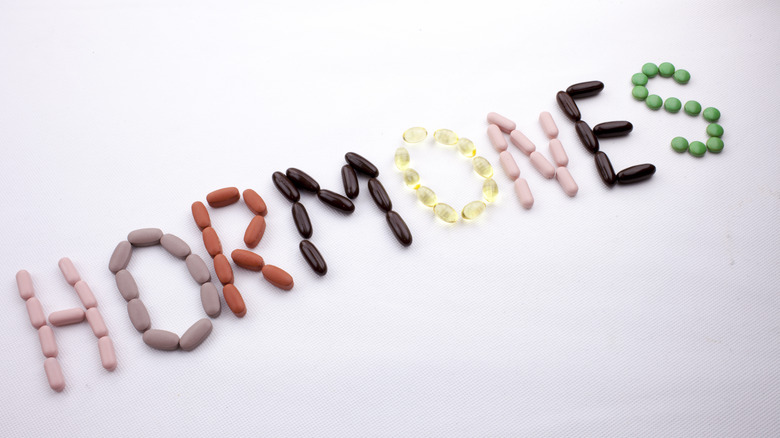What Happens To Your Body When You Get Hangry
It's 3 p.m. and you realize you just snapped at your coworker for asking a simple question. Or you are driving and get ridiculously angry at someone trying to simply change lanes in front of you. Suddenly, you remember you skipped lunch today and maybe breakfast too. You are now "hangry," a state of anger and rage fueled solely by hunger.
You have probably experienced being hangry first hand, but I have never seen it expressed so clearly as when my toddler misses a snack or I am running late preparing dinner. It's like a possessed child suddenly shows up at my house. Then as soon as he gets his food, he is back to the normal, calm child I know and love and the demon is gone. That demon is hunger, which quickly escalates into "hanger" in a toddler with limited verbal skills.
But even before being a mom, just in my work as a Registered Dietitian, I have seen how hunger can have serious effects on even an adult's mental state if it is allowed to get out of control. Here's what happens when you get "hangry."
Your blood glucose drops
The first thing that happens when you start to get hangry is that the nutrients from your previous meal are close to being used up. Although your body does have stored nutrients for emergencies, it wants you to eat again so that it doesn't have to dip in to those.
Glucose, which comes from foods that contain carbohydrates, is generally the primary fuel for your body and your brain. If blood sugar levels drop too low, your body begins to see this as life-threatening because your brain will not have its preferred fuel available to function. The body's main priority is to keep the brain alive, but without enough glucose available, your brain starts to find it difficult to concentrate or behave within social norms. This is when you feel irritated.
Your empty stomach signals your brain
Your body has many systems in place to help encourage you to eat to avoid feeling overly hungry. When blood sugar begins to drop, your stomach sends a signal via the vagus nerve to the brain that it needs food. This signal is usually accompanied by a feeling of emptiness and maybe some gurgling in the stomach. Once the signal reaches the brain, it sets off a cascade of signals to other organs in the body to indicate there is a possible emergency at hand.
The brain signals organs to release stored sugar
As part of that signaling mechanism, your body starts to release hormones in response. There are two main hormones released are meant to encourage the body to release stored sugar so blood sugar levels rise again. These hormones are called glucagon and growth hormone.
Glucose is stored in the body in a form called glycogen that is found primarily in the muscles and liver. Glucagon and growth hormone tell the body to begin to release the glycogen to get blood sugar levels back up and prevent the brain from being without food. The problem is that there is only so much stored glucose available at any given time, only about 2,000 calories worth, so depending on how long it has been since you have eaten your body needs to find other ways to get some sugar for your brain.
Stress hormones surge
Since the stored glucose is limited, the brain also sends out an emergency signal, telling the body to release stress hormones from the adrenal gland. These two hormones are epinephrine and cortisol.
These hormones are released to activate the "fight or flight" mechanism in order to motivate you to get out and find some food at any cost. They also cause you to get anxious and feel on edge because your body is literally getting ready to fight for food when it finally does come across it. Since we don't hunt for our food anymore, the body instead interprets even the most mundane offense as a huge catastrophe and a threat to your personal safety, causing you to snap.
Feel-good hormones drop
In addition to the surge in stress hormones, feel good hormones like dopamine drop. There is another hormone that is triggered when the stomach is empty called ghrelin. Ghrelin is a hormone that comes from the stomach and is a signal to the brain to tell us to eat.
When ghrelin is high in the absence of food, dopamine levels plummet. Basically, we start to feel pretty sad and angry since we have a lower level of "feel good" hormones around while stress hormones continue to rise. Dopamine levels also affect mental function, concentration, and the ability to keep our emotions under control. One more reason hunger quickly evolves into hanger.
You get desperate for any food
Sometimes you might surprise yourself at what you are willing to eat when hangry. Old granola bar at the bottom of your purse? Sure! Someone's lunch out of the work fridge? Why not? Although we know we shouldn't take someone else's lunch, low blood sugar in combination with high levels of epinephrine and cortisol literally turns us into impulsive, emotional beings completely lacking in self control. So, if you don't want to be known as the office lunch stealer make sure you pack yourself some extra snacks.
You might binge eat
Many people get into a state of hanger when they are trying to diet and cut calories too low. Dieting via starvation will likely just backfire causing you to binge eat when you finally do get some food. As we have discussed, your body has several systems in place to get you to eat when you are hungry. It doesn't really care that you want to lose 20 pounds for your friend's wedding next month, its only goal is to stay alive. In order to do that, it needs food.
Starvation diets will therefore likely result in you snapping at everyone in the office, then retreating to your car while you binge eat candy or chips or both outside the closest convenience store. And that will not only set you further from your weight loss goals, it will also not do much for your career.
If you want to lose weight, it is best done at a slower pace, allowing your body to slowly adjust to a lower calorie intake, rather than just trying to starve yourself.
You lash out at anyone and everyone
Hanger is likely a survival mechanism left over from days when food wasn't always available and we had to fight for it. Those who were willing to get aggressive in order to eat were most likely to eat. So, it makes sense in terms of evolution that hunger turns to hanger, but getting hangry may be detrimental to your personal relationships.
A study published in 2014 measured the blood glucose of married couples nightly over a 21-day period. The research subjects were also asked to stick pins in a voodoo doll that represented how angry they were at their partner that day. In order to measure aggression toward the partners, subjects were also asked to blast their partner with loud noises through headphones.
Researchers found that people with the lowest blood sugar levels were angrier. They put more pins in the voodoo doll and were more aggressive blasting their partner with loud sounds. Although this was a small study, we can see that blood sugar levels, and likely also hormones related to hunger, can have an effect on our anger and impact our personal relationships directly.








